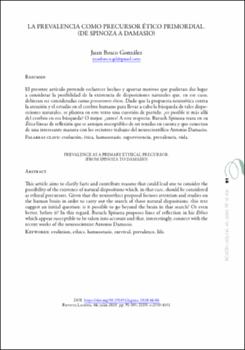La prevalencia como precursor ético primordial. (De Spinoza a Damasio)
Autor
Bosco González, JuanFecha
2020Resumen
El presente artículo pretende esclarecer hechos y aportar motivos que pudieran dar lugar
a considerar la posibilidad de la existencia de disposiciones naturales que, en ese caso,
debieran ser consideradas como precursores éticos. Dado que la propuesta neuroética centra
la atención y el estudio en el cerebro humano para llevar a cabo la búsqueda de tales disposiciones naturales, se plantea en este texto una cuestión de partida: ¿es posible ir más allá
del cerebro en esa búsqueda? O mejor, ¿antes? A este respecto, Baruch Spinoza traza en su
Ética líneas de reflexión que se antojan susceptibles de ser tenidas en cuenta y que conectan
de una interesante manera con los recientes trabajos del neurocientífico Antonio Damasio. This article aims to clarify facts and contribute reasons that could lead one to consider the
possibility of the existence of natural dispositions which, in that case, should be considered
as ethical precursors. Given that the neuroethics proposal focuses attention and studies on
the human brain in order to carry out the search of those natural dispositions, this text
suggest an initial question: is it possible to go beyond the brain in that search? Or even
better, before it? In this regard, Baruch Spinoza proposes lines of reflection in his Ethics
which appear susceptible to be taken into account and that, interestingly, connect with the
recent works of the neuroscientist Antonio Damasio.





